As caregivers, we prioritize our children’s well-being in every aspect of life, including their safety during travel. Car seats play a vital role in protecting our little ones during car rides, significantly reducing the risk of injury or death in the event of a crash. However, there’s a growing concern: non-compliant, and occasionally even counterfeit, car seats are finding their way onto the market, often purchased by well-meaning parents who unknowingly compromise their child’s safety. In this blog, we delve into the essential factors to consider when choosing a car seat.
Non-Compliant, Counterfeit Car Seats
Risks of Non-Compliant/Counterfeit Car Seats
If you end up with a counterfeit seat, it is unlikely to protect a child in the event of a crash. If you end up with a non-compliant seat, which is far more common, it might hold up in a crash. However, it has not met US standards, making it illegal to use.
The most notorious counterfeit seats are the ones that are made to look like the Doona. Doona has crash-tested some of these look-alikes and they fall apart during the crash testing! Legit Doona seats will have the word Doona+ on the handle and it will cost around $550. They rarely go on sale, and typically they won’t be more than 10% off. You can see the video of the crash test below.
Red Flags of Non-Compliant Car Seats
1. Look for Labels
Part of the Federal Motor Vehicle Safety Standards pertaining to car seat regulations (FMVSS 213) is about the required labels that must be on a car seat. These manufacturing labels must include the model name of the car seat, the model number, and the date of expiration, for example. The label must also state that the seat is compliant with the federal motor vehicle standards. There should also be stickers all over the seat with the height and weight limits listed and a warning label to not use a rear-facing car seat in front of an active airbag. If any of these required labels are missing and/or you see grammatical errors, this is a red flag. European labels tend to have picture labels with few to no words.


2. Check for missing parts
Chest Clips
While chest clips are not a required component, as outlined by FMVSS 213, all conventional car seats on the market currently have them. Some medical car seats do not have a chest clip, but the average parent is not buying these. If your seat does not have one, it is unlikely to have passed FMVSS 213 standards.
Five Point Harness


Many of the non-compliant infant seats that we have seen have 3-point harnesses instead of 5-point. A 3-point harness will be attached to the car seat with 2 shoulder harness straps and a crotch buckle. A 5-point harness has straps that go over the child’s hips as well. There are currently no conventional car seats with a 3-point harness, although some medical car seats like the Safety 1st Dreamride are 3-point. If your car seat has a 3-point harness, it is unlikely to comply with US standards. If it is a 5-point harnessed seat, you can measure the width of the harness to see if it’s 1.5″ wide, as that’s a required component of the US standards as well.
Installation Methods
Car seats that pass the US standards must be able to be installed using two different methods: the lower anchor installation and the seat belt installation. If the car seat came with a base, it must have lower anchors attached, and it also must have a way to install the seat belt instead. If the car seat did not come with a base, then the infant seat must have lower anchors attached to it AND a belt path for a seat belt installation.
3. Manual and Registration Card
Car seats that have passed the FMVSS 213 standards must also come with a manual and a registration card. The manual should have a lot of text in English and some pictures as well. If the manual is mostly pictures with very few words, that is a red flag.


The registration card that comes with the car seat allows caregivers to register their seat with the manufacturer. This registration allows parents to be notified promptly in case the seat has any recalls.

The absence of one or both of these should raise your suspicion of the seat being non-compliant.
What to look for when shopping
If you see a seat for sale online and the price is too good to be true, it’s likely a scam. You might not even get anything at all, but you definitely won’t get a legit car seat.
When buying a car seat, it is a good idea to stick to traditional retailers like Walmart, Target, Amazon, Albee Baby, and local baby shops. However, when buying from Amazon and Walmart, check the seller first. If it’s a third-party seller that you are unfamiliar with, you can Google them. Avoid buying car seats from places like Temu, AliExpress, or other foreign websites.
Choose a car seat from a known US manufacturer. We have a list of those below.
Known US Car Seat Manufacturers
- Babyark
- Baby Jogger
- Baby Trend
- Britax
- Bubblebum
- Century
- Chicco
- Clek
- Cosco
- Cybex
- Diono
- Doona
- Evenflo
- Graco
- KidsEmbrace
- Maxi Cosi
- Nuna
- Orbit Baby
- Peg Perego
- Safe Traffic Systems (Ride Safer Travel Vest)
- Safety 1st
- Uppababy
- Wayb
Shopping for a new car seat? Check out our recommended seats above!
What to do if you have a non-compliant or counterfeit seat
Using them in the US is not legal whether you have a non-compliant or counterfeit seat. If the seat has a label on the side indicating that it has met ECE-R44 or ECE-R129 standards, it is nearly always just a non-compliant seat vs a counterfeit one. However, these seats have not met the FMVSS 213 standards, so you will need a different car seat.
If you think you have a counterfeit seat, like one of the fake Doonas, file a report with the National Highway Traffic Safety Administration (NHTSA) by calling this number: 1-888-327-4236 or by filing an online report.
If you bought a seat from Amazon or Walmart and it is either non-compliant or counterfeit, file a complaint with the store’s customer service so they can remove the listing. They should also allow you to return the seat.
Conclusion
In conclusion, ensuring the safety of our children during travel is essential for caregivers. However, the increase of non-compliant and counterfeit car seats poses a serious threat to this safety. As highlighted in this blog, being vigilant and informed is imperative when selecting a car seat. Red flags such as missing labels, parts, or discrepancies in installation methods should not be overlooked. Moreover, purchasing from reputable retailers and known US manufacturers can reduce the risk of obtaining non-compliant or counterfeit seats.

